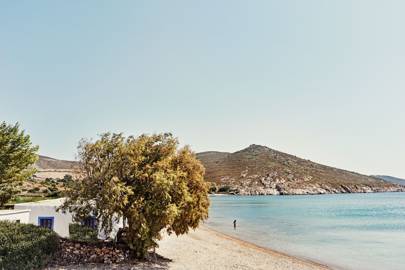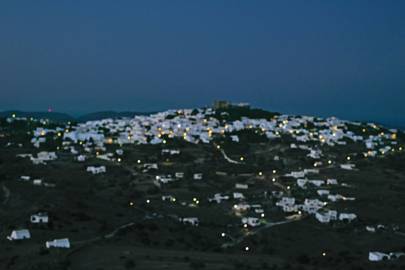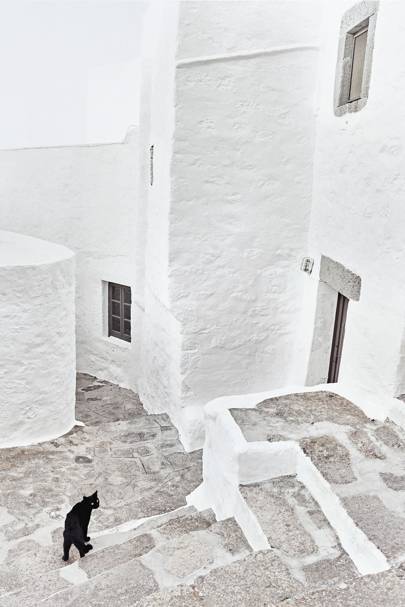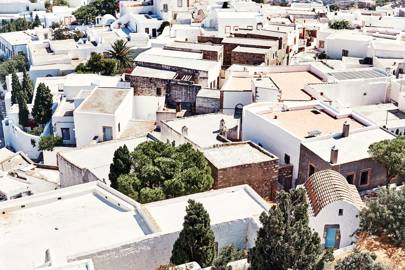Steeped in mystery, the Greek island of Patmos is where John the Apostle wrote the Book of Revelation. Centuries later, its deserted beaches and labyrinthine streets remain as enigmatic as ever

Livadi Geranou beach in Patmos
Perhaps everyone has their place or terrain, the one that lifts them in ways others cannot – Manhattan, the Atlas Mountains, Wembley Stadium, shopping malls in Singapore. Places that provoke anticipation and excitement in particular individuals in the way that food provokes salivary glands, or even that delight in existence itself for which we have no precise word but in Sanskrit is called ananda. For me, it’s the small, more remote Greek islands. It’s the white, silent villages, the fig and olive groves, the deep nautical blue of the Aegean that other seas seem not to possess, goat paths through a burnt, timeless landscape, the faces of fishermen, aromatic cloud banks of jasmine and wild thyme, skin taking on a glow of radiance and promise, wine in the sunshine, isolated coves, beach tavernas, vivid light moving through delicate, curative air. Patmos has all this and one other singular element emanating through the centuries from an apocalyptic vision recorded in a cave here at the end of the first century AD…
‘And there came out of the smoke locusts upon the earth…And the shapes of the locusts were like unto horses prepared unto battle; and on their heads were as it were crowns like gold, and their faces were as the faces of men. And they had hair as the hair of women, and their teeth were as the teeth of lions… And I stood upon the sand of the sea, and saw a beast rise up out of the sea, having seven heads and 10 horns, and upon his horns 10 crowns, and upon his head the name of blasphemy…’
John of Patmos, who may also have been John the Apostle, spoke these words while lying on his back on a stone floor to an amanuensis who then transcribed what became the Book of Revelation, that final and most mysterious of biblical works. It’s a vast and terrible account of evil and its vanquishing, of Armageddon, the wasting of Babylon and the founding of God’s Kingdom. He had lived in Ephesus, exiled to Patmos for his religious beliefs. So formidable and intense was his vision, it is said, that it split the cave’s ceiling in three, an everlasting reminder of the Trinitarian nature of God.

If you sail to Patmos from Athens you are likely to arrive at night. At first you will see what seems an impossibility – a circle of light floating several hundred feet above the sea. This is Chora, the island’s capital, a citadel city dominated by the Monastery of Saint John the Theologian, a dark massiveness in the halo. This was the project of Ioannis Christodoulos, who came to Patmos a millennium after John. Having spent much of his life in search of ascetic experiences in remote places, he believed he had found the epitome in Patmos. He obtained permission from the Byzantine emperor Alexius I Comnens to keep a fleet of trading ships and to found a monastic republic, and with his workmen began raising the monastery from the ruins of a Christian basilica and a temple to Artemis. He is said to have had enough piety to keep his monks remote from any worldliness while at the same time displaying a corporate CEO’s gift for mergers and acquisitions. Hermitages, a convent and more monasteries spread over the island. Its position on a trade route and its religious authority drew Greek shipowners and Venetian merchants, who built palaces in Chora. The confluence of zealot and emperor in 1088 made tiny, infertile Patmos one of the most powerful and prosperous places in the Mediterranean.
I first came to Patmos 21 years ago. I stayed in the valley behind Kambos beach in the north. I remember the operatic trills of cockerels and the delicate tinkling of goats’ bells, a sound like a stream playing a xylophone. The Milky Way was barely visible above the hilltops. White owls made forays from trees. Monastic authority was still sufficient to prevent music after midnight. I remember old men bent under immense bales of hay, donkeys trampling grain, monks with Rasputin-like beards, louche Austrian aristocrats, seekers after the mystical. I found it beautiful, serene and elegantly constructed, but also unsettling, intriguingly so. I wasn’t quite sure why.
The allure remained, but I didn’t go back until the late spring of last year. The ferry rounded the southern tip of the island and I finally came to the lights of the harbour, Skala. Almost all the island’s commerce is here, but its subservience to the elevated Chora is in its name, which means stairs. Christos Kamitsis, a mason like his father, met me here. Stone by stone he built a summer house for his family at Sapsila to the south, and kept building until he had made a settlement of arhontikas, small cottages, which comprise Eirini’s Luxury Hotel Villas, named after his wife. He loves stone, he says. He feels its individual life and he loves the mansions of Chora too, whose features he duplicated and whose spare furniture he salvaged for his arhontikas. When I went into mine I felt an immediate, unaccountable lift. Everything I saw seemed to delight me. A light touch, perhaps, of ananda.

Backstreets of Chora
Patmos is elongated, vertical, somewhat hourglass-shaped. It is only 12km from top to bottom. I moved by motorbike and on foot, going out to the extremities by day, and staying around the centre where the population is concentrated at night. The monks’ political authority had faded a little in 20 years, but they, along with the old wealth of Chora, had still held out against an airport and seaplanes, and kept development gentle. The island’s shape alone allows for great entertainment while in transit, its mountains and coves and narrowness providing constantly changing, even disorienting vistas. I went north at first, around the serene protrusion of Meloi and then up towards Kambos, turning left down a dirt path to the deserted beach of Lefkes, overlooked by a startling, high-towered, mustard-coloured folly made by a rich Patmian for his Egyptian bride from materials brought from Alexandria. Kambos, like Grikos to the south, is a domesticated beach, but due north is Lambi, renowned for its multi-coloured stones of intricate design. ‘Chagall! Matisse! Pollock!’ exclaimed an excitable Athenian to me years ago. ‘The stones of Lambi are painted with God’s hand.’ The taverna here is famed for its fried cheese.
Extending eastwards is the cape of Vagia, now incorporated into the island by road, with fine, deserted beaches shaded by tamarisk trees all the way to the little church at the end. Further south beyond Grikos the landscape is even less developed. Patmos’ most dramatic beach is at Psili Amos, a cove often roaring with waves, that you get to by boat or a kilometre-and-a-half walk from Diakofti. There is a little taverna where goats are sometimes slaughtered for stifado stew. Walking back in evening light I passed a donkey with red panniers carrying an old man and his grandson. If I go back again I would like to camp at Psili Amos.

View of Chora, the main town of Patmos, from the Monastery of Saint John the Theologian
The central unavoidable fact, and also the great mystery of the island, is Chora. It sprawls over the summit of a hill from the grey fortress monastery. Within it are intricately embroidered and jewelled tributes from all over the world, plus a piece from Catherine the Great, an El Greco icon, visionary frescoes, altar screens so ornate they are impossible to take in and marble floors worn down by the sandals of centuries of devotional monks.

Wildflowers on the island
Its library contains one of the most important collections in the eastern Mediterranean, including a memoir on a scroll by Ioannis Christodoulos. One absence, explained the black-clad, pale and whispering librarian, is a ninth-century codex of Plato’s dialogues, now in the Ashmolean Museum at the University of Oxford (a kind of textual Elgin Marbles). He held the books as if they were newborn children. I later learned that he is prized as the island’s premier cocktail-maker.
Radiating out from the monastery are passageways unusually labyrinthine, even by Greek standards. Modest doors lead to magnificent homes with lush gardens, rooms hand-painted in a Venetian manner and patios inlaid with stones from Lambi. You can get a sense of them from Simandiris House, where 90-year-old owner Mrs Simandiris will show you around. Prince Sadruddin Aga Khan, stalled in Patmos while his boat was being repaired, bought one in the late 1960s, inaugurating a yearly summertime migration of aristocrats, artists and models that feels like something from Proust or Flaubert. Giorgio Armani’s black yacht has sailed in. David Bowie, in battered jeans, was given a lift by Prince Sadruddin, who thought him a poor drifter. Eric Clapton jammed with a crewman on a yacht and Bob Geldof hitched a ride on a motorbike. But the overriding feeling of Chora is of doors closed onto private worlds. It is white, silent, modest and enigmatic, like nuns at prayer. Some call it Kafkaville, as though it is marking time, waiting for the reappearance of some mysterious authority.
Did I find the source of what had unsettled me in such a compelling way 21 years ago? The word ‘ineffable’, with its admission of inarticulacy, would normally be out of place in a travel article. But I cannot report what I experienced without it. Person after person spoke of the strange and powerful energy that instantaneously repels some and exhilarates others. Not all were hippies, or neo-hippies. Grace, or at least centuries of holy contemplation, has given this energy a serenity that can embrace you. It is also severe. Patmos has been ravaged by pirates, devastated by famine and earthquake, sacked by Venetians and occupied by Ottomans, Italians and Nazis, and through it all Ioannis Christodoulos’s monastery has endured. You can lie on a beach, wander paganly and thoughtlessly along a goat path amid birdsong, and there it will be, above you. Take a drink in Skala at night and across the bay you will see a gigantic illuminated crucifix. God is gracious and God is wrathful; life is beautiful and life is serious, the island seems to be saying.
‘For all the nations have drunk of the wine of the wrath of her fornications… And the merchants of the earth are waxed rich through the abundance of her delicacies… Standing afar off for the fear of her torment, saying Alas, alas, that great city Babylon, that mighty city! For in one hour is thy judgement come…’

